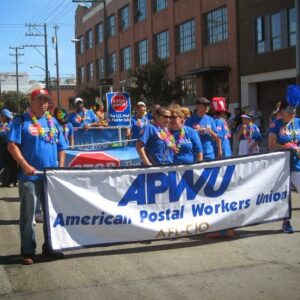April 2, 2019
What’s to Come in Interest Arbitration
(This article first appeared in the March/April 2019 issue of the American Postal Worker magazine)
By Industrial Relations Director Vance Zimmerman
Our efforts to reach a new contract are now entering the next phases of mediation and interest arbitration.
In mediation, an impartial mediator engages the Postal Service and the APWU negotiating teams in an attempt to break through any impasses and reach an agreement. If mediation does not lead to a voluntary agreement, we will move to interest arbitration.
Most of you are familiar with grievance arbitration – also called rights arbitration. During rights arbitration, an impartial arbitrator is presented testimony, receives evidence and arguments, and then writes an award. Hearings last a few hours or a few days. The rights arbitrator can’t change the contract language, but decides whether someone’s rights under the contract have been violated.
In contrast, an interest arbitrator has the power to write contract language – to change rights, determine pay, benefits, and work rules. In doing so, he/she considers the interests of the parties in various proposals.
Working together with the core negotiating team and craft officers, we have been preparing for the possibility of interest arbitration throughout negotiations, including researching, collecting data, and working with professionals. The union must present facts, data, and arguments to convince the arbitrator why he/she ought to favor APWU proposals over USPS proposals.
This arbitration will involve a panel of three (3) arbitrators. APWU will appoint an advocate arbitrator – someone advocating for the union’s views. The Postal Service will also have an advocate arbitrator. The parties will then jointly select a neutral arbitrator who will chair the panel and run the hearings.
Selecting the neutral arbitrator is a complicated process. Given that even a single penny increase in hourly wages would result in a cost of millions of dollars to the USPS and that the union and the USPS will present a lot of economic data in the arbitration process, the neutral arbitrator must be experienced and able to deal with large numbers.
Each side will provide a list of arbitrators they would like to see as the neutral arbitrator. We will then attempt to mutually agree on the neutral. If the sides cannot mutually agree to an arbitrator, the Federal Mediation and Conciliation Service (FMCS) will provide the parties a list of arbitrators. Then, each side will eliminate an arbitrator until there is only one name remaining. That final name would then be the neutral arbitrator and panel chair.
With the panel set, arbitration can commence. In past interest arbitrations, multiple hearing dates have taken place. When hearings conclude, both parties may submit closing briefs before the panel goes into deliberations and issues an award establishing our new contract.
During the hearings, we will present data and evidence that supports our proposals. We have engaged a team of economists who will detail relevant trends in the economy, comparison of wage levels and trends in comparable jobs. The economists will also present publicly available data that is relevant to postal compensation, work hours, benefits, and scheduling. Panels of employees from every APWU craft and many different jobs will explain what they do and the conditions in which they work. Experts will provide testimony in job analysis and job comparisons. We will also present survey data from many sources. Your craft officers will testify about the work their crafts do and how important it is. Also, other subject matter experts will explain why we need changes to certain work rules. Finally, we will spend a lot of time and effort in the hearings to rebut the testimony and evidence of the Postal Service.
This effort requires a team of national officers, attorneys, staff, dozens of witnesses, and hundreds of exhibits. It will require days of hearings to present our case and days of hearings to rebut the case the Postal Service will present. Together with your core negotiating committee and craft officers, we promise to work hard to get a contract that recognizes your value. Let’s work and stand together. Show management our unity and solidarity as we are Fighting Today for a Better Tomorrow!



